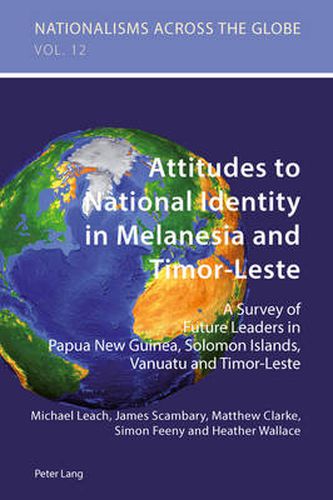Readings Newsletter
Become a Readings Member to make your shopping experience even easier.
Sign in or sign up for free!
You’re not far away from qualifying for FREE standard shipping within Australia
You’ve qualified for FREE standard shipping within Australia
The cart is loading…






This title is printed to order. This book may have been self-published. If so, we cannot guarantee the quality of the content. In the main most books will have gone through the editing process however some may not. We therefore suggest that you be aware of this before ordering this book. If in doubt check either the author or publisher’s details as we are unable to accept any returns unless they are faulty. Please contact us if you have any questions.
This book examines the attitudes of tertiary students in Melanesia and Timor-Leste to national identity and key issues of nation-building. Their views are pivotal to understanding the challenges of building a more cohesive sense of national identity and political community in these states. Melanesian countries show a relatively high degree of similarity in their responses to the surveys on national identity carried out by the authors, but with key differences attributable to particular historical, regional or linguistic legacies of colonial rule. The ongoing importance of traditional authority and kastom/adat in conceptions of political community and identity is evident in all four case study sites, and in each case matches indicators of respect for modern state authority. Although different for each site, the authors’ findings also illustrate the importance of students’ geographical region of origin, language orientation and gender in explaining key differences in attitudes towards national identity. The book demonstrates that strong levels of national identification and pride persist among the future leaders of the countries surveyed, even in the face of ongoing regional and linguistic divisions and weak state capacity, suggesting a strong potential basis for nation-building agendas if wider challenges of democratic performance, service provision and regional development can be addressed over time.
$9.00 standard shipping within Australia
FREE standard shipping within Australia for orders over $100.00
Express & International shipping calculated at checkout
This title is printed to order. This book may have been self-published. If so, we cannot guarantee the quality of the content. In the main most books will have gone through the editing process however some may not. We therefore suggest that you be aware of this before ordering this book. If in doubt check either the author or publisher’s details as we are unable to accept any returns unless they are faulty. Please contact us if you have any questions.
This book examines the attitudes of tertiary students in Melanesia and Timor-Leste to national identity and key issues of nation-building. Their views are pivotal to understanding the challenges of building a more cohesive sense of national identity and political community in these states. Melanesian countries show a relatively high degree of similarity in their responses to the surveys on national identity carried out by the authors, but with key differences attributable to particular historical, regional or linguistic legacies of colonial rule. The ongoing importance of traditional authority and kastom/adat in conceptions of political community and identity is evident in all four case study sites, and in each case matches indicators of respect for modern state authority. Although different for each site, the authors’ findings also illustrate the importance of students’ geographical region of origin, language orientation and gender in explaining key differences in attitudes towards national identity. The book demonstrates that strong levels of national identification and pride persist among the future leaders of the countries surveyed, even in the face of ongoing regional and linguistic divisions and weak state capacity, suggesting a strong potential basis for nation-building agendas if wider challenges of democratic performance, service provision and regional development can be addressed over time.